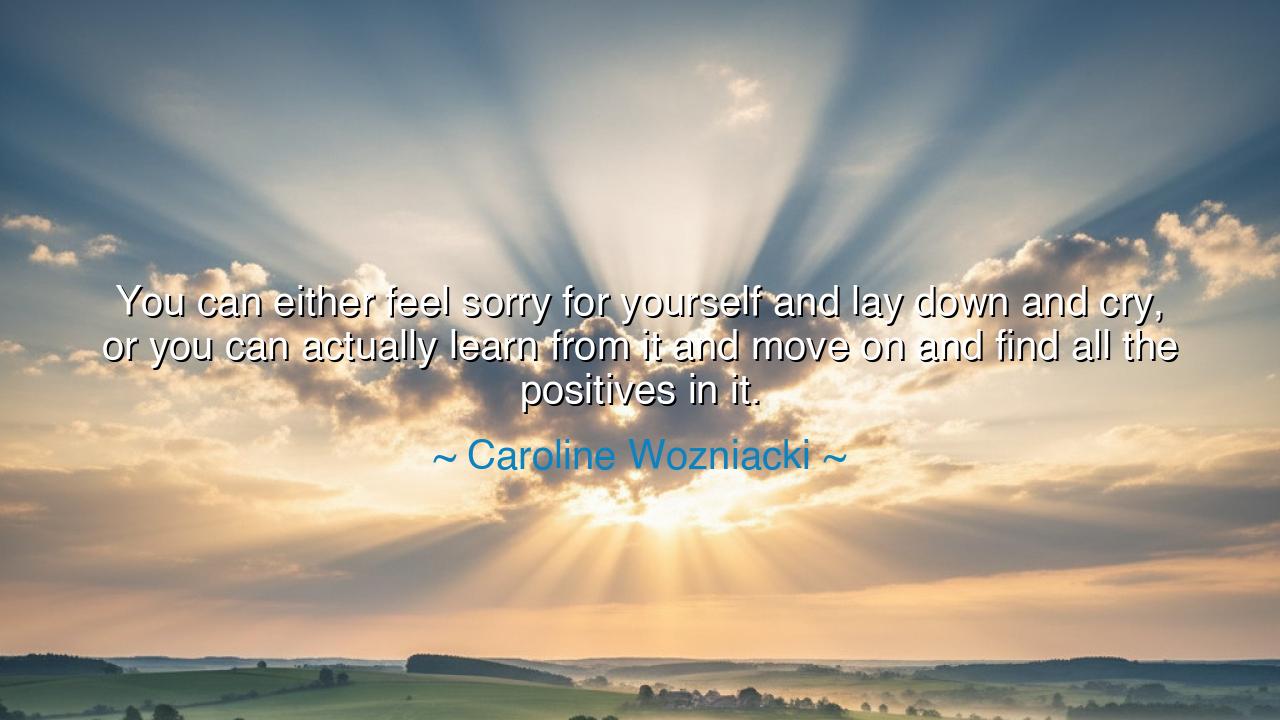
You can either feel sorry for yourself and lay down and cry, or
You can either feel sorry for yourself and lay down and cry, or you can actually learn from it and move on and find all the positives in it.






The words of Caroline Wozniacki—“You can either feel sorry for yourself and lay down and cry, or you can actually learn from it and move on and find all the positives in it.”—resound like the counsel of a warrior who has faced both victory and defeat upon the battlefield of sport and life. In them lies the eternal truth that suffering, loss, and disappointment are not optional in the human journey, but our response to them is. To feel sorry for yourself is to surrender, to lay down one’s arms and be conquered by despair. To learn, move on, and find the positives is to transform adversity into strength, to rise renewed from the ashes of defeat.
The ancients knew this truth well. The Stoics of Greece and Rome, such as Epictetus, taught that pain itself cannot break a man—it is his choice to lament or to rise that determines his fate. The Buddha, centuries earlier, declared that suffering is woven into the fabric of existence, yet it can lead to enlightenment when one seeks understanding rather than self-pity. Wozniacki’s words echo these timeless teachings: adversity itself is neutral, but the heart’s response transforms it into either bondage or liberation.
History offers a shining example in the life of Helen Keller. Struck blind and deaf as a child, she could have easily lain down in despair, mourning the darkness and silence that closed around her. Yet instead she chose the second path—to learn from it, move on, and find the positives. With the help of her teacher Anne Sullivan, she became not only educated but a voice of inspiration for millions, proving that the human spirit can overcome barriers once thought insurmountable. Her life is living testimony to Wozniacki’s wisdom: that self-pity destroys, but learning and moving forward creates miracles.
To lay down and cry is natural in the first moment of loss; it is the soul’s way of acknowledging pain. But to remain there is dangerous, for sorrow can turn into a swamp that swallows strength. On the other hand, to rise, to reflect, and to find positives is to become master of the very pain that sought to break you. This does not mean ignoring hardship, but transforming it—turning wounds into wisdom, failures into lessons, and losses into the soil of future triumphs.
The power of this teaching is also practical. When a door closes, ask: what new path does this reveal? When betrayal wounds you, ask: what truth about myself and others have I now learned? When failure humbles you, ask: what skills, patience, or endurance has this trial forged in me? Each act of reframing transforms misfortune into hidden treasure. In this way, you stand not as a victim of fate but as a sculptor of destiny.
The lesson for us is luminous: we may not control the blows that life delivers, but we always control our choice—to sink into pity or to rise in growth. This is the secret of resilience, the heart of courage, and the path to greatness. Those who choose the second path not only heal themselves but also inspire others, becoming beacons of strength in a world that often trembles.
So, dear listener, take Caroline Wozniacki’s words as both challenge and encouragement. When sorrow comes, do not deny your tears, but do not live in them. Wipe them away, rise to your feet, and seek the hidden positives in your trial. For every hardship carries within it a seed of strength, and every failure holds the promise of wisdom. To learn, to move on, and to grow is to live as a hero of your own story—and in so doing, you will shine a light for generations yet to come.






GDGold D.dragon
This quote makes me think about the psychological techniques behind turning negative experiences into growth. Are there concrete methods to consistently identify positives in adversity, or is it highly situational? I also wonder whether this mindset can be cultivated intentionally, like a skill, or whether it relies largely on innate temperament. Could the approach be applied outside high-performance contexts, like everyday personal or professional setbacks?
ATKieu Anh Tran
I’m intrigued by the dual-path framework suggested here: either succumbing to self-pity or using setbacks as learning opportunities. But I question whether framing it so starkly leaves no room for nuance. Can one experience moments of self-pity and still grow positively from the experience? How do we navigate the messy middle between acceptance of difficulty and proactive improvement without feeling guilty for natural emotional reactions?
HLChau Hoang Lam
This quote sparks a reflection on mindset and responsibility. It frames responses to setbacks as a choice, which is empowering, but is that always fair? External circumstances or repeated failures may limit one’s ability to immediately find positives. I wonder how factors like support systems, culture, or personal history influence the feasibility of this approach, and whether resilience is equally accessible to everyone.
XXUXU
Reading this, I feel inspired by the idea of proactive growth, yet I also worry about the societal expectation it implies. Are we often encouraged to 'move on' too quickly, potentially ignoring the deeper emotional work needed? I’m curious about strategies people use to genuinely learn from challenges while still honoring their emotional experience. How do we differentiate between healthy processing and simply forcing positivity?
PLNguyen Hoang Phuong Linh
This perspective makes me reflect on the role of personal agency in shaping outcomes. Learning from failure and finding positives seems empowering, but does it risk oversimplifying the complexity of human emotion? How can we teach ourselves or others to genuinely extract lessons from setbacks without feeling pressured to suppress natural sadness or frustration? It raises questions about resilience versus emotional authenticity.